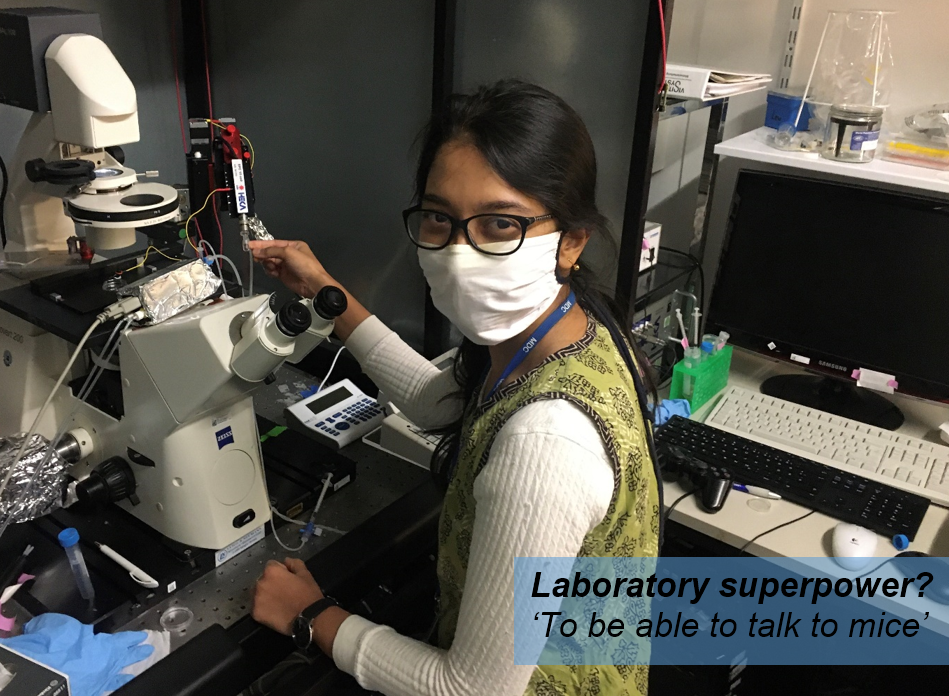An Interview with Dr Sampurna Chakrabarti
Dr Sampurna Chakrabarti is an incredibly successful former member of the Pharmacology Department. Originally from Kolkata, India, Sam completed her undergraduate studies at the University of Buffalo, and was then awarded a Gates Cambridge PhD studentship. She was a member of the Department between 2016 to 2020, in which time she published a number of key findings, including demonstrating that osteoarthritic synovial fluid can drive knee pain by sensitising neurons.
More recently, Sam was awarded the highly prised Alexander von Humboldt Postdoctoral Fellowship, which she holds in the Max Delbrueck Centre for molecular medicine in Berlin. We interviewed Sam and asked her about her experience working in Pharmacology.
Who are you and what do you work on?
I am an Alexander von Humboldt postdoctoral research fellow working at Max Delbrueck Centre for molecular medicine in Berlin in the lab of Prof Gary Lewin.
What do you love about your job?
I love that I get to pursue questions for which there are no known or simple answers.
How/why did your research lead you to Cambridge? *
I first got a taste for research as an undergraduate student at the University of Buffalo, NY, USA where I investigated the molecular pharmacology of glycine and GABA receptors. However, I wanted to understand more about their physiological roles which led me to the field of pain research. Then, I applied to the lab of Dr Ewan St. John Smith at the Pharmacology Department in Cambridge to understand the roles of different ion channels involved in pain. I was fortunately accepted to his lab and received a full scholarship from the Gates Cambridge Foundation to conduct my PhD at Cambridge.
Other than science what is most important for you in life? *
Being with people I love and travelling - preferably travelling with people I love.
Do you have any advice to early-career women scientists? *
Have some people in your life to whom you can confide all your worries and celebrate all your successes. Also, pick your battles wisely, sometimes it's okay to not stand up to somethings to preserve mental peace and productivity.
What/Who first sparked your interest in Science?
Growing up with parents who pointed out science of daily life and watching the joy my mother felt by doing science.
Why is science fun?
Science is fun because I get to collaborate with really smart people and come up with cool new ideas.
What and when was the last experiment you did in the lab?
My general field of research is to understand how we perceive touch (mechanosensation). This is an important pursuit because in many chronic pain states (for e.g., neuropathies and arthritis) our sense of touch is hypersensitive, such as even light touch is perceived as being painful. However, only a handful of ion channels have been discovered so far, meaning that the search for other mechanosensitive proteins is still on. One way to study mechanosensation at a cellular level is to subject cells to mechanical forces and record their electrical response. This can be achieved by combining whole cell electrophysiology with blunt probe poking of the cells. Currently, I am working towards dissecting the role of a novel putative mechanosensory protein using mouse genetics and electrophysiological tools. My last experiment was yesterday, when I expressed this protein in HEK cells from which other mechanosensory proteins have been edited out, and performed whole cell electrophysiology on them to record their response to mechanical force. The preparation stage involved growing cells on a petridish and then transfecting them so that they express the protein of choice.
If you were to choose a laboratory superpower what would it be?
To be able to talk to mice.
What female scientist do you most admire and why?
Rita Levi Montalcini. She is known for her Nobel-prize winning work on the discovery of nerve growth factor, however, people are often unaware of how her scientific journey was interrupted by Holocaust and rampant anti-Semitic sentiments.
How do you relax?
Reading novels and sketching
Image credit: © Felix Petermann MDC media team

